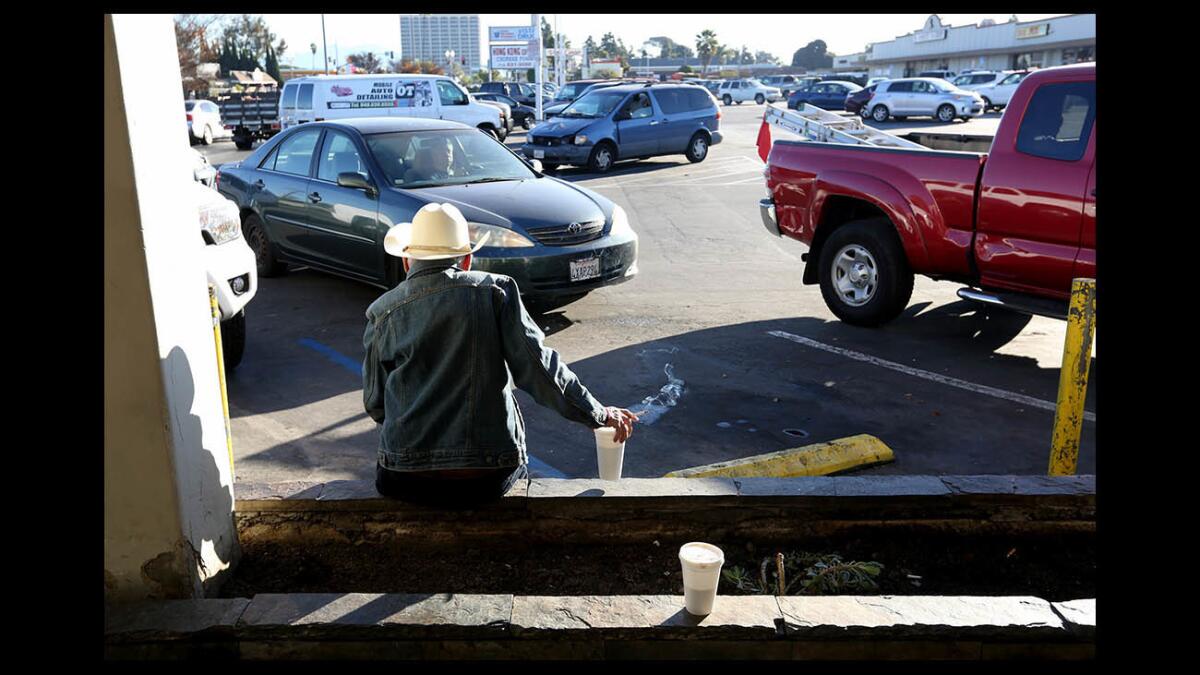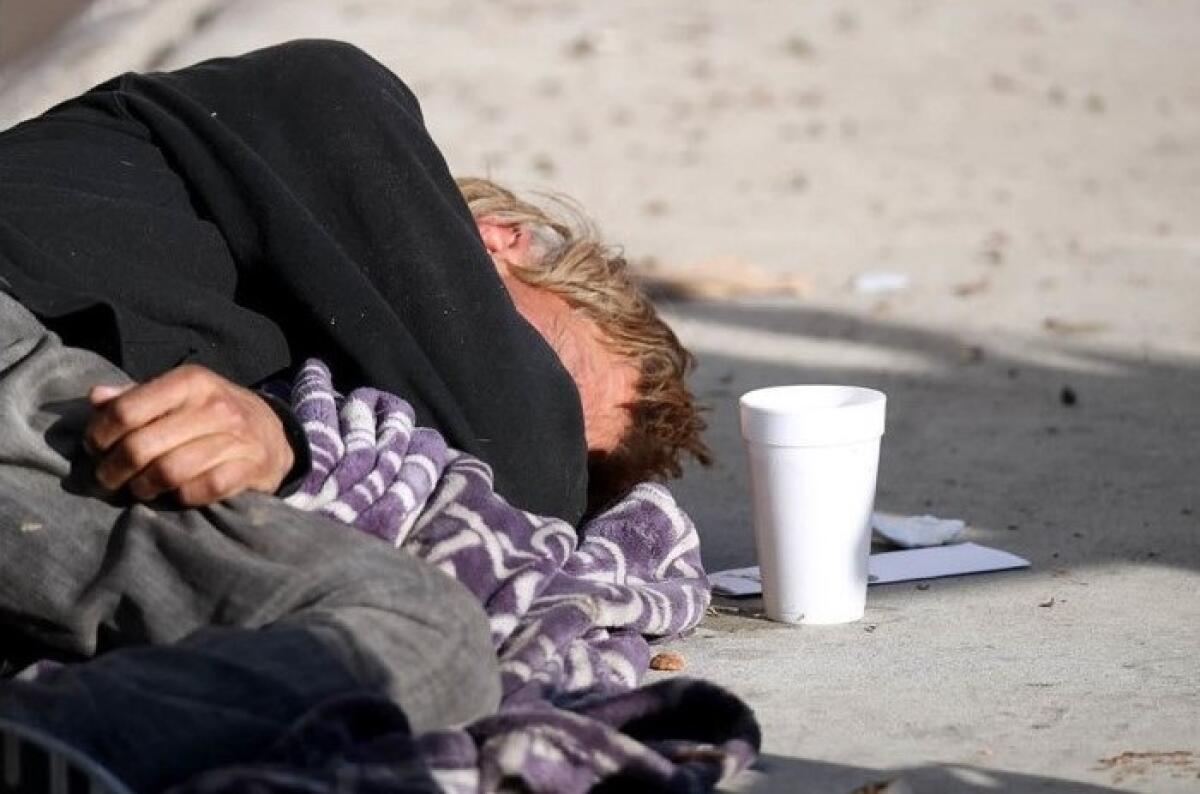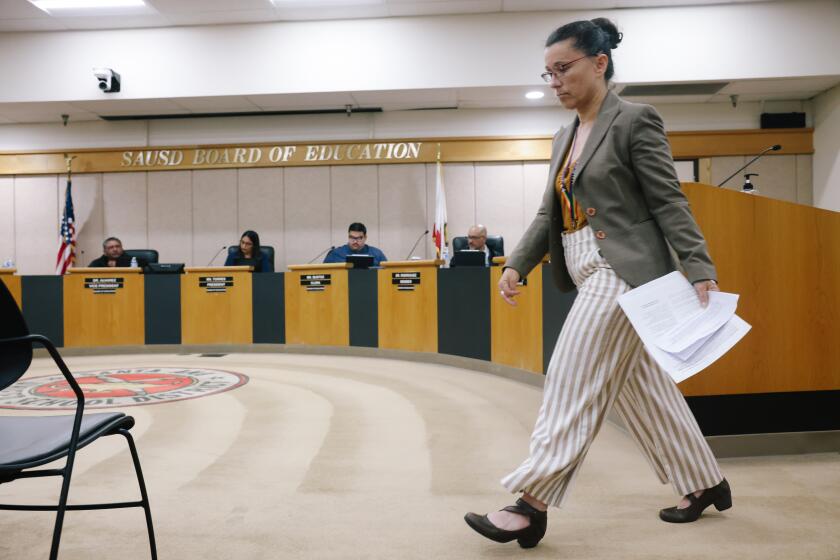Orange County’s first safe parking program runs out of money as advocates call for countywide program

- Share via
A program that provided safe parking for homeless people living out of their cars recently ended in Fullerton.
The program was the first of its kind in Orange County, which has never had a safe parking program.
Advocates see the program as crucial for the homeless people who used it. As the pandemic economy continues to spiral, they are hoping the county will take a cue from the city of Fullerton and adopt a countywide program to help those in need.
For homeless people who live in their cars, finding a safe place to park is a major obstacle. With many cities having overnight parking prohibitions, the homeless are forced to park in unsafe areas that put them at risk.
“There should be more safe parking throughout because we know that there are plenty of individuals and families that are living out of their vehicles,” said homelessness activist Dave Duran. “That’s going to grow because of evictions, foreclosures, and because of the lack of jobs. There’s going to be a growing need for safe parking as the economy continues to crash due to COVID.”
When Fullerton started the safe parking program in November 2019, it was expected to run until the summer. The city was able to extend the program with the help of CARES Act funding. That funding ran out on Dec. 30.
The initial six-month run of the program cost the city about $80,000. The extension cost the city about $15,000 per month.
Expenses included bathrooms, hand-washing stations and security.
Fullerton originally contracted with the Illumination Foundation for the first few months, then switched to Pathways of Hope when it extended the program.
“It was a big leap, you know, it hadn’t really been done in Orange County ever and for Fullerton to do that was great,” said David Gillanders, executive director of Pathways of Hope. “... We talked to the county, we talked to other folks about trying to take the program and try to regionalize and make it something bigger.
“But I think right now, there’s so many things up in the air that in terms of funding for COVID-related activities and additional homeless dollars, there just wasn’t much of an ability to do it. But we’re still trying and I think the city of Fullerton has been super supportive of that effort.”

Gillanders said the safe parking program also included other support services for the homeless who used it. He said they served about 17 total homeless people and placed three into permanent housing.
The nonprofit also helped pay for car repairs and connected them with services to get food, job training and other resources.
There were about 10 cars and RVs parked in the lot on an ongoing basis.
“The whole design of the program was certainly not to just be a place to park but to be a place that could start the process to do some kind of permanent housing intervention,” Gillanders said.
Gillanders said there will likely be an influx of people living in their cars in the coming months due to the pandemic economy.
Orange County’s homeless have already suffered the most deaths recorded in a single year.
With nonprofit-driven safe parking programs in Los Angeles and San Diego, Gillanders wants to see some action from the county.
“When we talk to representatives of the county, including county supervisors, it’s like we’re at the point where we saw such value and still see such value in this kind of program existing that we don’t even need to be the contracted operator,” Gillanders said. “You just need to find a spot to do this. You need to rally the resources and find a parking lot.”
Fullerton City Manager Ken Domer said the city will work on compiling statistics to determine how well the program worked.
“So sadly, it’s hardly ever about the humanity of things, it’s more often about the dollars and cents,” Duran said. “But even so, I’m optimistic that safe parking will eventually get recognized as one of the least expensive ways to help to take care of people who are living in their cars.”
While safe parking is seen as a relatively inexpensive way to support a specific contingent of the homeless population, it hasn’t attracted widespread use.
Some of that could be owed to Gov. Gavin Newsom’s decision in 2019 to veto a proposed bill that would have required cities and counties with a population greater than 330,000 to establish safe parking programs.
“We should leave these decisions up to local governments to make right-size decisions to address this crisis,” Newsom said in his veto message.
Father Dennis Kriz, a homeless advocate who leads St. Philip Benizi Church in Fullerton, said the city should just designate a parking lot for the homeless to park in. Kriz’s church is part of the Fullerton Tri-Parish Homelessness Collaborative, which advocated for the safe parking program.
”... It doesn’t have to cost money,” Kriz said. “If we don’t have the money for a Grade-A system, why not just a Grade-B, -C or even just ‘passing’ system.”
Residents also continue to be an ongoing obstacle to establishing programs to help the homeless in Orange County.
“Of course residents here are quite upset, and legitimately upset — they don’t want to see the RVs and vans parked across the city here,” Kriz said. “But then, well, if they don’t really have a place to go, that’s a problem. You know, think this thing through ... Some sort of a parking program would improve the quality of life of the city or of the region if they only realized that these people are here if they have no place to park. You don’t just park anywhere if you do have a designated place for them to park. That just makes things really so much easier for everyone.”
All the latest on Orange County from Orange County.
Get our free TimesOC newsletter.
You may occasionally receive promotional content from the Daily Pilot.




